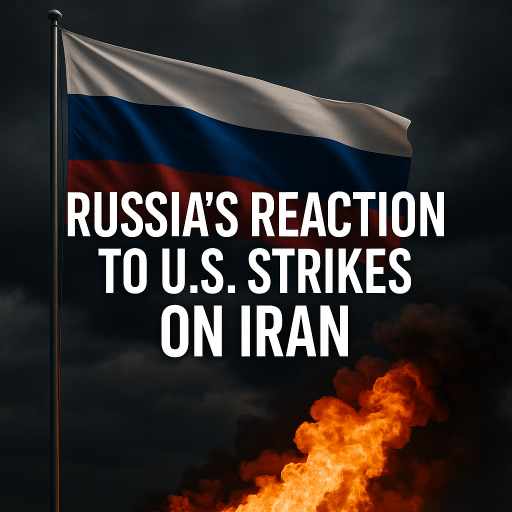The recent U.S. airstrikes on Iran’s nuclear sites have shocked the global community, sparking strong reactions from allies, rivals, and neutral powers alike. Among the most vocal and strategic responses has come from Russia, a long-standing geopolitical rival to the United States and a key ally of Iran. While official statements express concern and condemnation, Russia’s broader response hints at deeper strategic shifts, with possible long-term implications for the Middle East and global power dynamics.
In this article, we analyze Russia’s perspective, potential military and diplomatic consequences, and what the world might expect in the aftermath of these attacks.
Russia’s Immediate Reaction: Strong Condemnation
Within hours of the strikes on Iran’s Fordow, Natanz, and Isfahan nuclear facilities, Russian officials issued a series of strongly-worded condemnations:
- Foreign Ministry Spokeswoman Maria Zakharova described the attack as “a blatant violation of international law” and warned of the possibility of a nuclear disaster if radioactive materials were affected.
- Deputy Chairman Dmitry Medvedev stated that former President Trump had “started a new war for America” and called the attack a “criminal and irresponsible act.”
- Kremlin spokesman Dmitry Peskov emphasized that the Middle East is now “on the brink of a large-scale catastrophe,” and called for immediate de-escalation.
- Lawmakers in the Russian Duma called the U.S. actions “illegal” and demanded emergency sessions at the UN Security Council.
These reactions highlight Russia’s alarm over the legality, timing, and regional risks of the U.S. attack.
Strategic Interpretation: More Than Just Condemnation
While the official tone is diplomatic, Russia’s strategic posture reveals deeper concerns:
1. Containment of American Expansion
Russia sees this as another move by Washington to dominate the Middle East. By attacking Iran — a country aligned with both Russia and China — the U.S. is perceived as undermining the multipolar order that Moscow has long advocated.
2. Defense of Allies
Iran is a strategic partner to Russia in both defense and energy cooperation. A direct assault on Tehran’s sovereignty represents a threat to Russian influence in the region and risks weakening the Iran-Russia-China axis.
3. Warning Signal to Moscow and Beijing
If the U.S. can strike a sovereign nation’s nuclear infrastructure with limited international backlash, Moscow fears that similar doctrines might eventually be applied elsewhere — including Eastern Europe or the Pacific.
What Could Happen Next? Russia’s Potential Moves
1. Diplomatic Retaliation
Russia will likely push for emergency UN Security Council meetings, using its veto power to block any U.S.-sponsored narratives. It may also attempt to pass resolutions condemning American aggression, building a coalition with China, BRICS, and non-aligned nations.
2. Military Alignment with Iran
Though direct intervention is unlikely at this stage, Russia may:
- Supply advanced missile defense systems (e.g., S-400 or S-500) to Iran
- Conduct joint military exercises in the Persian Gulf
- Deploy naval presence in the region to deter further attacks
These moves would send a strong deterrent message without crossing into war territory.
3. Strengthening the China-Russia-Iran Axis
The attacks are likely to accelerate the strategic convergence of Moscow, Beijing, and Tehran. This could result in:
- Shared intelligence networks
- Bilateral defense treaties
- More aggressive moves in currency de-dollarization and sanctions resistance
Global Implications: Toward a Multipolar Conflict?
With tensions now heightened, the possibility of a wider regional conflict or even global confrontation cannot be dismissed:
- Israel may face increased retaliation from Iran-backed groups
- U.S. military bases in Iraq, Syria, or the Gulf could be targeted
- Russia and China may push their boundaries further in Ukraine and Taiwan respectively, exploiting America’s new focus
Conclusion
Russia views the U.S. strikes on Iran not just as a military action, but as a strategic escalation that threatens the entire international order. Moscow is likely to respond not through direct warfare, but through diplomatic pressure, regional realignments, and strategic deterrence.
The situation now hangs in delicate balance. Any further miscalculation — by the U.S., Iran, or its allies — could turn the current standoff into a full-blown geopolitical crisis.
Check More:
- US military bases used in iran attack
- Iran Israel latest cities hit missiles
- GBU-57 Mop iran underground bunker threat

